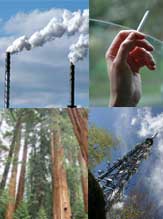Toxicology and Risk Assessment
 This group is the Risk Assessment unit for all state agencies. Risk assessment is a scientific process in which we estimate the amount of chemical exposure possible and combine that with the toxicity of the chemical(s) to estimate the risks to the general public. We use this technique to identify levels of contaminants in the environment (air, water, soil, food) that may be a health risk. In this manner, we help set cleanup standards. We also apply this to toxic chemical incidents that may involve spills and releases to the air, soil and water (e.g., chemical fires, tanker car accidents).
This group is the Risk Assessment unit for all state agencies. Risk assessment is a scientific process in which we estimate the amount of chemical exposure possible and combine that with the toxicity of the chemical(s) to estimate the risks to the general public. We use this technique to identify levels of contaminants in the environment (air, water, soil, food) that may be a health risk. In this manner, we help set cleanup standards. We also apply this to toxic chemical incidents that may involve spills and releases to the air, soil and water (e.g., chemical fires, tanker car accidents). Selected Topics
-
Ethanol Report to the Legislature: DPH issued a joint report with CTDEP at the end of 2006 that described the environmental and public health implications of using 10% ethanol in gasoline.
- TCE Trichloroethylene
Wood burning in any form produces nuisance odors and smoke. The smoke is made of very small particulates that can have serious health effects if concentrations are high enough.
CT DPH is aware of numerous complaints due to smoke coming from various wood burning devices including “outdoor wood boilers” and wood stoves. Owners of wood burning devices can follow some simple steps to reduce the amount of smoke produced. The primary precaution is to only burn dry, well seared wood.
Neighbors negatively impacted by wood smoke may file complaints with a number of government agencies. CT DEP regulates Outdoor Wood Burners (OWBs) and they should be your first call if you live near a problem OWB: CT DEEP Wood Burning Web page
Your local health department can also respond to wood smoke violations, as well as your local Fire Marshall.
Response to Wood Burning Complaints in Connecticut (pdf)
Guidance to support local health directors in their effort to address local nuisance complaints stemming from woodburning.
Outdoor Wood Boilers (NYDH)
Wet Wood is a Waste (video)
Technical Briefs:
- Coal Tar Driveway Sealants - 9/2014
- Hand Sanitizers - 12/2009
- Eating Fish: Risks and Benefits - 6/2010
- Spray Polyurethane Foam Insulation - 12/2010
- 2016-49 Important Reminder Regarding Coal Tar Sealants for Road Repair
- 2013-64 DEEP DPH Outdoor Burning Devices
- 2010-81 Wood Smoke Guidance Training

